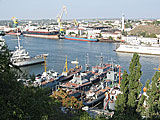Ukraine Elections: The Russia Angle
By Jeremy Druker for ISN
It’s election season in Ukraine, and that usually means at least two things: Russia is both a major campaign topic and itself has been attempting to influence the outcome.
Over the past month, the maneuvering in the runup to Ukrainian presidential elections in January has been taking place amid the backdrop of rapidly deteriorating relations with Russia.
In an open letter sent on 11 August and external pagein a post of his video blogcall_made, Russian President Dmitri Medvedev accused his Ukrainian counterpart, Viktor Yushchenko, of pursuing a deliberately “anti-Russian” course that had brought the countries’ relations to “unprecedented lows”; Medvedev said a few days later that he thought relations could not improve under the current Ukrainian leadership.
The two leaders have also sparred over the Black Sea fleet in Crimea, with Yushchenko saying Russia has no chance of extending its lease beyond 2017 and Russia countering that Ukraine had been obstructing the fleet’s operations.
Earlier this week, the Russian prosecutor general's office said that both regular Ukrainian soldiers and hundreds of paramilitary troops fought on the Georgian side in last year’s war against Russia over South Ossetia. The BBC reported that it was thought to be first time that Russian officials had “made such a direct accusation in a long war of words between Moscow and Kiev about the conflict.”
The Russians claimed to have evidence - including Ukrainian anti-aircraft weapons, uniforms, and other personal articles - that prove the presence of Ukrainian Defense Ministry soldiers and “at least” 200 members of the UNA-UNSO nationalist organization (members of that group fought against the Russians in the 1990s alongside Chechen rebels). Ukraine denies any official involvement of its troops in the Georgian conflict, though it hasn’t refuted Russia’s accusations about selling weapons to Georgia.
The timing of all of Moscow’s rhetoric has prompted many Ukrainian analysts to recall Russia’s heavy-handed support of presidential hopeful Viktor Yanukovich in 2004. That strategy helped sway many middle-of-the-road voters over to the “Orange” camp, leading to Yushchenko’s eventual victory in an election re-run after widespread allegations of vote-rigging.
But many things have changed since the so-called Orange Revolution. Although Russia's recent moves might still drive more nationalistic Ukrainians over to Yushchenko’s camp, there is virtually no chance that the president - deeply unpopular, with only single digit approval ratings - will win this time. Yanukovich has a lead in opinion polls with Prime Minister Yulia Tymoshenko setting herself up as something of a compromise candidate, more acceptable to some western-leaning liberals than Yanukovich, but much more Russian-friendly than Yushchenko.
The idea then that Russia is interfering in an attempt to derail its least desired candidate makes little sense, both because Moscow certainly learned from 2004 and because Yushchenko is almost out of the running.
In greater likelihood, Medvedev’s posturing must be seen in combination with other high-profile moves, such as his recent proposal to give Russia’s military the legal right to intervene outside the country’s borders in order to defend a third country against aggression, and Prime Minister Vladimir Putin’s visit this month to Abkhazia, where he promised to invest as much as half a billion dollars in 2010 to build up the separatist region’s defenses.
As Volodymyr Fesenko, director of the external pagePenta Political Analysis Centercall_made, told the Glavred news portal, Moscow has other, broader goals in mind: “This is where it lets the whole world community understand that Russia is continuing its hard-line foreign policy line on the territory of the former [Soviet] Union, and is prepared to make use of the widest spectrum of methods and means to pursue its interests.”
Ukraine is just one part of that message of intimidation.

